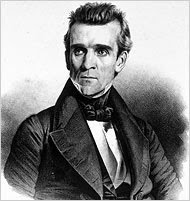
James K. Polk, the 11th President, has a reputation that languishes in obscurity, partly because he is said to be the driving force behind igniting the War with Mexico. He served only one term in office. Competing views of Polk have emerged, partly because of a new book being published this month, "A COUNTRY OF VAST DESIGNS, James K Polk, the Mexican War and the Conquest of the American Continent", by Robert W Merry. Recent history has seen Polk relegated to the role of a shameful imperialist and seizer of territories along with being a carrier of the "slave-holder" sentiment into the formerly neutral West. With his victory in war with Mexico, he added territories comprising California, Nevada and Utah, as well as parts of New Mexico, Arizona, Colorado and Wyoming. The book reminds historians that by 1845 The United States was the only functioning democracy in the world. The book also points out that Mexico, far from being a benevolent neighbor, was brutal and corrupt and a republic in name only. The war occurred from 1846 to 1848. Polk himself was said to be colorless and maddeninglly ambivalent in speeches, making him hard to label or characterize. He was said to be "smaller-than-life" but harboring "larger-than-life" ambitions and felt determined to act on his own counsel. He saw expansionism as the nation's work and believed that it would override all of the partisan concerns of the day. In this, he appears to have erred because the westward expansion appears to have inflamed the pro-slavery sentiments as well as the anti-slaver's belief that slavery should not go to the new territories. This unsettled the balance that was thought to have been achieved with The Missouri Comprise of 1820-21. These partision clashes led a dozen years later to the Civil War. His role as a promoter of the California Gold Rush is mentioned regularly in Haggin training. The new book plants a flag for a new thought that Polk was a shrewd expander of the American vision of itself and more than a greedy imperialist.

